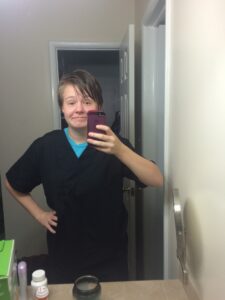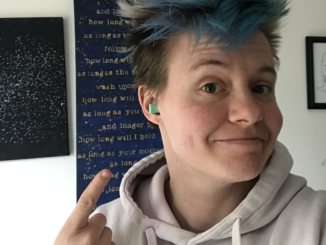I was very surprised how difficult I found OT school.
I am the type of person for whom school has always come easily, at least in terms of getting decent grades easily and so on. I have a brain that takes tests well. The information just makes sense to me.
Some of the more rigorous classes were academically challenging, but the academics wasn’t what I was struggling most with. I struggled quite a lot with how far removed OT school seemed from anything practical that I could hang on to.
I had been dreaming of becoming an OT for years on end. I had been endlessly frustrated by the parts of high school that felt trivial and pointless to me; I was the kind of teenager who was absolutely dying to get out into the world and “do things with my life”. Then, going to college and finding out that the OT program I thought existed actually didn’t…was a huge shock. I found my undergraduate schooling very valuable (eventually), but it was still pretty frustrating to still not be doing what I wanted with my life! So I had always assumed that OT school would solve this longing for me, that I would finally have made it. And then…not.
For starters, there was the fact that OT was actually so much more than I had envisioned it being. To me, OT was synonymous with pediatrics — working with children. It had literally not even occurred to me that there existed other settings for OT. And then, much to my shock, it turns out that in an entire three-year program I had only one class about pediatrics! So the vast majority of my schooling was non-pediatric.
I learned about how to work in skilled nursing facilities, in rehabilitation. I learned intricacies about nerves and muscles and bones. We began school with dissecting a cadaver. It felt incredibly far removed from what I wanted to be doing with my life. (Never in my time in practice have I ever had to do surgery on anyone!)
Now, looking back in retrospective, I find some of the information really valuable. The problem was that without any kind of pragmatic experience to link it to, I really struggled to connect the information with how it would apply in my career. Even the pediatric class was confusing and hard to apply until after I had done fieldwork. It’s like I was supposed to hold 2 years of theory in my head, then go work in the field and begin, only then, to see how it applied to real life and real people.
Going to OT school was the first time that I ever questioned whether OT was actually the right field for me. I had dreamed of it for years. I had shadowed OTs as prep for OT school, and I had loved everything I learned from them. I had volunteered with a school for children with disabilities for a couple of years, and I had loved every second of that. Then going to OT school made me question myself and if this was really right for me.
I think about that, about my brain that needed to understand “why” before it could make sense of the things that it was learning. I think about how frustrated I felt with feeling expected to just memorize meaningless things without understanding why.
An example — I remember missing a question on a test because I referred to something as “an assessment” instead of “an evaluation”. To me, the terms assessment and evaluation were synonymous, because in plain English, they are fairly synonymous. I didn’t know at the type that “assessment” is OT jargon for a standardized test that might be administered as part of “an evaluation”, which is OT jargon for the entire, start-to-finish examination that an OT might do to evaluate (and assess!) a child to receive occupational therapy.
Even now, with full knowledge of the jargon, it’s hard for me to define one of the terms without using the other! An evaluation? Sure, that’s when I do assessments. An assessment? Sure, I do that as part of an evaluation. But really the two terms are arbitrary jargon…they’re only that way because of the common connotation that you pick up after doing the job for a few years. And that wasn’t the point of the question on the test, so missing it was only frustrating and felt like, “You have to memorize all this dumb jargon before you can even be part of this field.”
I think about that when I work with children who are struggling at school. I try to keep that feeling in mind, because sometimes I look at my kids and I can practically see their brain going, “Why the heck would I ever need to know how to hand write something? Everybody in my life, except for me, has a phone! They *type* on it all the time! Nobody is writing and it’s not at all meaningful to me!”
And they’re not wrong. Like, there’s this essential part of occupational therapy: it’s what the word “occupational” means, it doesn’t mean job-related (although people think that all the time, understandably!) It means basically whatever occupies your time. Whatever you do all day long—your job, your hobbies, your self-care, your chores. Occupational therapy is supposed to be rooted in what is inherently meaningful to people, what occupies their time.
I think there’s this expectation that children, in general, are so subject to what other people think ought to occupy their time, instead of being allowed to be in control of their own time, that sometimes pediatric OTs even get into a rut of thinking that they can just decide what the child ought to be doing as part of OT. And I can’t deny that many OTs practice that way, and maybe even see success in their practice that way.
I just can’t, personally, get my head around that. The client is the child, not the child’s parents or the child’s school. Yes, adults can know and understand things in a way that children sometimes can’t, and I write my goals for the children based on the level I know that they ought to get to or need to get to for some reason or another — academic success, life success, being able to live in their own body, whatever it may be. But then it’s also my job to make it occupationally meaningful to the child, not meaningless, not just dictated down from adult height for them to follow unquestioningly.
I *hated* being treated like that. I hated how many years I had to spend on things that seemed meaningless and weren’t explained to me in a way that mattered. I had an intense passion in my heart and all I wanted in life was to be able to charge headlong into that passion and begin finding a way to do the things I loved. Instead, I had to jump through hoop after hoop, often hoops that were irrelevant or I didn’t understand. If there’s any way that I can take the next generation and connect them with their passion and bypass some of those meaningless hoops, then I’m going to do that instead.



